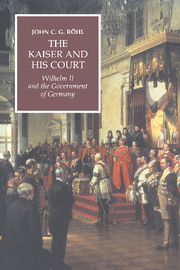Book contents
- Frontmatter
- Dedication
- Content
- Preface to the English edition
- Introduction
- 1 Kaiser Wilhelm II: a suitable case for treatment?
- 2 Philipp Eulenburg, the Kaiser's best friend
- 3 The Kaiser's court
- 4 The ‘kingship mechanism’ in the Kaiserreich
- 5 Higher civil servants in Wilhelmine Germany
- 6 The splendour and impotence of the German diplomatic service
- 7 Dress rehearsal in December: military decision-making in Germany on the eve of the First World War
- 8 Kaiser Wilhelm II and German anti-semitism
- Notes
- Index
5 - Higher civil servants in Wilhelmine Germany
Published online by Cambridge University Press: 05 October 2015
- Frontmatter
- Dedication
- Content
- Preface to the English edition
- Introduction
- 1 Kaiser Wilhelm II: a suitable case for treatment?
- 2 Philipp Eulenburg, the Kaiser's best friend
- 3 The Kaiser's court
- 4 The ‘kingship mechanism’ in the Kaiserreich
- 5 Higher civil servants in Wilhelmine Germany
- 6 The splendour and impotence of the German diplomatic service
- 7 Dress rehearsal in December: military decision-making in Germany on the eve of the First World War
- 8 Kaiser Wilhelm II and German anti-semitism
- Notes
- Index
Summary
Administrer, c'est gouverner; gouverner, c'est régner: tout se réduit lȧ.
Mirabeau to Louis XVI, 3 July 1790In the last two or three decades of the nineteenth century, the scope of governmental activity began to increase at an unprecedented rate in the industrialised countries of Europe and North America. As it did so, as governments came to intervene more and more in the day-to-day lives of individuals, demands for a thorough reform of recruitment methods in the higher branches of the civil service grew more insistent. In Britain, France and the United States, patronage had to make way for recruitment by competition, for it was intolerable that the affairs of a modern industrialised society should be in the hands of people who might barely be able to read or write. In Prussia-Germany the problem was the very reverse. Ever since the days of Frederick William I, Prussia had recruited talented commoners to the bureaucracy. Frederick the Great had set up a commission to test aspirants to public office, and candidates were expected to have a university education and to pass two or even three examinations. The Prussian Allgemeines Landrecht of 1794 laid down that ‘no-one must receive a post who is not sufficiently qualified and has not given proof of his ability. Whoever has achieved office through bribery or other impermissible means must be dismissed forthwith.’ In the Government Instruction of 23 October 1817 the Prussian departments of state were directed to ‘act always with strict checks and impartiality in the matter of appointments, looking first and foremost to loyalty, industriousness and skill rather than length of service’. ‘Public offices are open to all those who have the talent thereto’, read clause 4 of the Prussian Constitution of 1850, ‘provided they fulfil the conditions laid down by the law.’ By the time Bismarck united Germany and transferred the Prussian tradition to the Reich administration, candidates had to study jurisprudence for three years at university, undergo a four-year training period in the law courts, and pass two stiff civil service examinations before qualifying for the higher grade of the civil service.
It is therefore not surprising that the machinery of administration in the parliamentary systems of western Europe was frequently seen in Germany as corrupt and incompetent.
- Type
- Chapter
- Information
- The Kaiser and his CourtWilhelm II and the Government of Germany, pp. 131 - 149Publisher: Cambridge University PressPrint publication year: 1994



